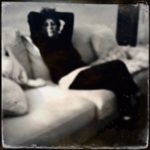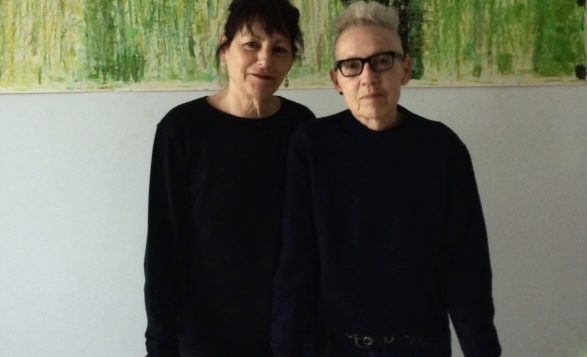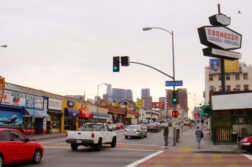
Back in the day, definitions of gender and sexuality were nonexistent. Nicknames took the place of pronouns. Being queer was limitless. Born to transplanted New Yorkers who reveled in their gay friends’ soirées and elaborate costume parties, my queer life started at an early age. Otherwise sleepovers and attractions might have been more confining. The only thing that defined me was the literary arts. Saturdays were passed at the library, where I read and stocked up on books to get me through the week. Nights were extended. Sneaking paperbacks with lurid covers, I read by flashlight. My early adulthood taste evolved with my first loves, Flannery O’Connor and Toni Morrison.
When I finished my degree in French drama, I drove my mother’s old big Buick to the town of Harvard, Mass., to work as a live-in housekeeper for a Chinese philosophy professor who hosted academics and intelligence officers. I wrote short stories, learned to cook and clean, until he landed in the hospital when his bipolar disorder triggered the gun that went off upstairs as I read about Agatha Christie’s death in Time magazine.
Wanderlust in my early years gave me front-row seats to real-life characters who defied social norms and lived fearlessly. Always guiding me was: where to write next? Provincetown seemed a likely candidate, and was where I met my gay best friend Lenny. Reluctantly I adopted the moniker of Fruit Lady, supplementing my writing habit by selling fruit salad from a stainless-steel cart at the Meat Rack and the A-House after midnight to hydrate sweaty dancers and lovers. Many luminaries crossed my path, including Divine and John Waters’ cast, when I attended the premiere of Desperate Living alongside our artist friend George, Mink Stole’s brother. Those days were slim pickings in the financial department, and Lenny kicked me out of our one bed to entertain his coterie of admirers. We called that the “Year of the Crabs,” long before the AIDS crisis.
When a blizzard forced Boston to “surrender,” we shoved his car out of a wall of snow and drove to Key West, where Europeans and Americans flocked to open shops, salons, restaurants and bars. We lived in the Cuban neighborhood and fashioned a kitchen sink on the roof. I wrote and worked at an outdoor café, gladly accepting illicit substances that the locals left for tips. In the fall, with our proceeds, we traveled through Europe, ending in Denmark, where a smitten set designer hid Lenny’s ticket home.
A mysterious pull to Charleston, South Carolina, coincided with the launch of the legendary Garden & Gun Club, by D.C. transplant Dick Robison, the financial director of Spoleto, alongside Italian composer Giancarlo Menotti. Tired of hanging out at the scuzzy gay bar in town, they turned a defunct 14,000 square-foot JC Penny’s into a private club. Promoted from bartender to manager, I ran the pulsating, raucous disco that broke the glass ceiling of a staid Southern harbor town, home to one of the largest slave traders of the 18th century. The transformation was extraordinary. A haven for every walk of life: performers, drag queens, plumbers, artists, lawyers, waiters, navy recruits, and housekeepers. Black, white, brown, rich, and poor mixed with bluebloods, heterosexuals, trans people, and queers. When the disco was forced to move, a nearby church and the authorities brought this bastion of liberty and revelry to an end.
My wanderlust ended in ‘80s New York. While protesting with ACT UP, devastated by the crippling loss of too many friends, I wrote about the terrifying AIDS crisis and the Iran Contra scandal. At the New School, I took “Unblocking the Creative Process” from a retired soprano and met my best genderqueer friend, Nicke Gorney, a brilliant visual artist. As activists in committed relationships, we shared our deepest secrets on weekly walks home to the East Village, at protests in New York and D.C., at El Teddy’s in Tribeca, and across the dance floor of the Clit Club. The relationship was always inspiring as art ones often are.
After a screenwriting course by Meade Roberts, who adapted Summer and Smoke and The Fugitive Kind for Tennessee Williams, he invited me into his writing group of screenwriters, journalists, and theater critics. My work placed in the finals for the Writers Guild and Houston Film Festival competitions and was a quarter finalist in the Nicholls Fellowships. From my screenplay Zero Gravity about a playwright’s struggle with AIDS, chronicled in his burlesque play “The Myths of Venus,” I landed an Edward Albee Fellowship for my play Personal Effects, about a chef who dies from AIDS and returns to observe his flamboyant, avaricious friends reminiscing as they rifle through his personal effects.
Unprepared to move to L.A. to jumpstart a screenwriting career, I turned to prose and fiction. One sultry New Year’s Eve in the early ’90s, the ghost of Sappho transported me to the other side of the table. Accusations of a romantic entanglement with Nicke over seven years of a platonic friendship finally came true. In 1993 we began our art life together.
In 2005 we launched TheGroovyMind.com, an organic, Fair Trade online store. Our main intention was to educate and encourage consumers to shop for sustainable and socially responsible goods while we scraped by to support our art. The New York Times covered our fledgling enterprise, and solar and wind companies, progressives, and online shoppers turned to us for sustainable business and personal gifts.
A move to Montréal to care for ailing parents shuttered The Groovy Mind, but an executive decision led us to devote ourselves full-time to our work. We joined the Climate March and met our adopted sons. Nicke continued as an abstract painter and photographer, represented by a Montréal gallery. I wrote two novels, engaged in the arts’ networks, and landed a contract with feminist publisher Inanna Publications for Slow Reveal, slated to launch on May 3rd. While all good stories come to an end, our art lives on.
 Bio: Melanie Mitzner’s novel Slow Reveal will be published by Inanna Publications in May. An excerpt of her novel Too Good to Be True was published in Harrington Lesbian Literary Quarterly. She was awarded an Edward Albee Fellowship for her play Personal Effects, and her screenplay Dodge and Burn was a finalist in the Writers Guild East Foundation Fellowships.
Bio: Melanie Mitzner’s novel Slow Reveal will be published by Inanna Publications in May. An excerpt of her novel Too Good to Be True was published in Harrington Lesbian Literary Quarterly. She was awarded an Edward Albee Fellowship for her play Personal Effects, and her screenplay Dodge and Burn was a finalist in the Writers Guild East Foundation Fellowships.






Discussion2 Comments
I think the best part of the lgbtq+2 is the way to bring people into the world and show that there is no judgment and everyone is equal
Just googled you and am so glad you’re still together and happy and healthy. You were so friendly to me in Southold. Would love to hear from you both.